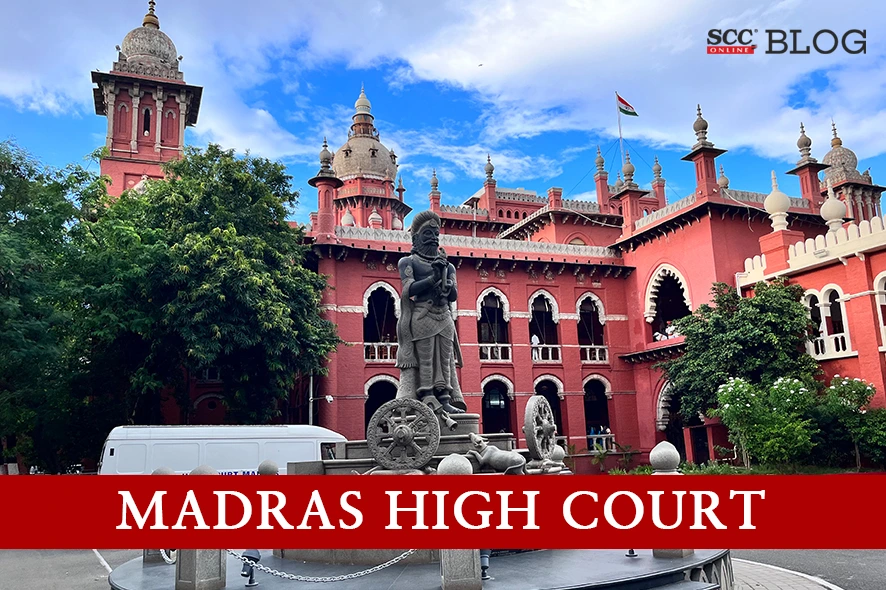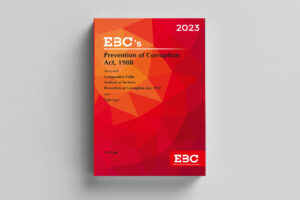Madras High Court: In a criminal appeal filed by former Minister of labour welfare A.M. Paramasivam’s wife under Section 374(2) of the Code of Criminal Procedure, 1973 (‘CrPC’) for setting aside the judgment dated 15-11-2000 passed by the Special Judge, wherein the Court found both of them guilty and sentenced A.M. Paramasivam to undergo two years of rigorous imprisonment and his wife to undergo one year of rigorous imprisonment, G. Jayachandran, J. while upholding the Trial Court’s judgment of conviction, imposed one year sentence on A.M. Paramasivam’s wife for aiding him to acquire wealth beyond his known source of income.
Background:
A.M. Paramasivam, was the elected Member of the Tamil Nadu Legislative Assembly from 1991 to 1996, he was the Minister for Labour Welfare in Government of Tamil Nadu from 1993 to 1996. Hence, he fall under the definition of public servant. He along with his wife, had acquired properties beyond the known pecuniary resources, which were disproportionate to the extent of Rs.38,72,545/- during the check period between 1991 to 1996. He was tried for the offence under Section 13(2) read with 13(1)(e) of Prevention of Corruption Act, 1988. The properties were acquired in his name, his wife name and in the name of his minor children mentioning his wife as guardian, therefore his wife was tried for aiding him to commit the offence.
The Trial Court found both of them guilty. Aggrieved by the judgment of conviction and sentence passed by the Trial Court, the present appeal was preferred by them. Pending appeal, A.M. Paramasivam , died. His wife filed an application to continue the appeal and same was allowed by this Court.
The prosecution case was that at the beginning of the check period i.e., 16-06-1991, A.M. Paramasivam had in his possession of agricultural land measuring about 5 acres and an ancestral house in a Village, besides that Rs.1000/- cash in hand and sovereigns of gold jewels which were given as Sridhana during his marriage. At the end of the check period i.e., 09-05-1996, the value of the properties was assessed as Rs.39,78,986/- which includes the immoveable properties purchased in the name of their minor children and his wife. She, who had no independent income worth mentioning, had aided her husband to acquire this wealth in her name and in the name of her children as their representative and natural guardian. During the check period the income of the public servant and his family members from known sources was assessed as Rs.7,09,330/-. During that period the probable expenses for him and his family consisting of 4 members was assessed as Rs.6,03,889/-. His likely saving from the income through known source after defraying expenses assessed as Rs.1,05,441/-. Thus, he had properties worth Rs.38,72,545/- disproportionate to the known source of income which is about 546 %.
A.M. Paramasivam contended that the assets held by them at the beginning of the check period were not properly considered. The income derived from the agricultural income has not been taken into account. If the prosecution properly taken the agricultural income, then the accusation of amassing wealth illegally would have been disproved.
Issue: Whether the Public Servant was in possession of assets disproportionate to his known source of income?
Analysis:
The Court noted the order passed by the Income Tax Department (‘ITD’) and said that A.M. Paramasivam had apparently exaggerated his agricultural income, camouflage his other income under the garb of agricultural income. Therefore, for the difference, he has to pay income tax and penalty. The said assessment order was challenged by A.M. Paramasivam, wherein it was held that, due to better farming practise, A.M. Paramasivam, could have gained higher yield and corresponding income.
The Court said that the ITD has not tested whether the source of the income is fake or genuine. Further, it noted that these orders came to be passed after initiating criminal prosecution and delivery of judgment. The very source claimed by A.M. Paramasivam tested in the Criminal trial and the material placed by him to show additional source for the income not been substantiated through reliable evidence, except some ipse dixit testimony of interested witnesses.
The Court said that except for about 5 acres of land in possession at the beginning of the check period, A.M. Paramasivam had not produced acceptable evidence to show that they had other lands and were under his direct cultivation. The income disclosed in the Income Tax Returns and the finding of the ITD confines to income assessable to tax. It is not proof for income to assess tax or not, but it is not per se be a proof that the assets from which the income derived were acquired legally. The said amount was neither found in the house of the accused during the search proceedings nor reflected in the bank accounts maintained by them.
Thus, the Court held that the list containing assets owned by A.M. Paramasivam and his family members at the beginning of the check period at the beginning of check period does not suffer any omission or error to interfere.
Further, the Court further held that having obliged her husband to keep the ill-gotten income other than the known source of income, by lending her name for purchase of properties both in her name and in the name of her minor children showing her as guardian, she is guilty of abetment under Section 109 of IPC.
The Court reiterated that in case of disproportionate assets acquired by the Public Servant, the initial burden is on the prosecution to prove objectively the property found in possession of the accused were disproportionate to his known sources of income.
After meticulous examination, the Court found that, if at all any benefit in error of assessment regarding the value of assets acquired during the check period to be given, it can only be to a tune of Rs.2 lakhs which is in respect of Architect fees and the value of household articles claimed to be received as gift. Even, if concession of Rs.2 lakhs is given to the value of assets acquired during check period, the disproportionality will be reduced to only marginally and not to the extend to fall outside the scope of the offence under Section 13(1)(e) of the P.C Act or Section 109 read with Section 13(1)(e) of P.C Act.
Thus, the Court said that it is evident that A.M. Paramasivam was first accused of being a public servant and had acquired wealth above 400% of his known source of income. From an undeclared source, the properties been acquired by the public servant in his name and in the name of his wife and minor children. His wife has lent her name for purchasing the property through source undeclared. Therefore, the Court upheld the Trial Court’s judgment of conviction dated 15-11-2000.
Concerning the sentence imposed on his wife for aiding, the Court said that the offence being acquiring wealth by a public servant beyond his known source of income and his wife for aiding the public servant, had been sentenced for one-year rigorous imprisonment, which being the minimum sentence prescribed under the law. So, there cannot be further reduction of sentences. In such circumstances, the wife has to be sentenced to undergo at least the minimum sentence which is one year.
[A.M. Paramasivan v State, 2023 SCC OnLine Mad 7563, decided on 20-11-2023]
Advocates who appeared in this case :
For Appellant: Advocate M. Velmurugan
For Respondent: Additional Public Prosecutor Babu Muthu Meeran









